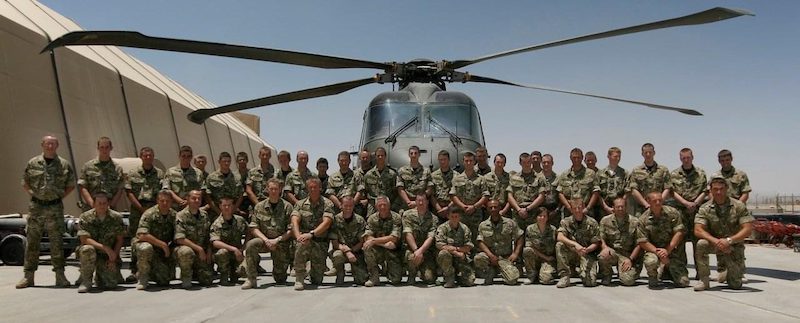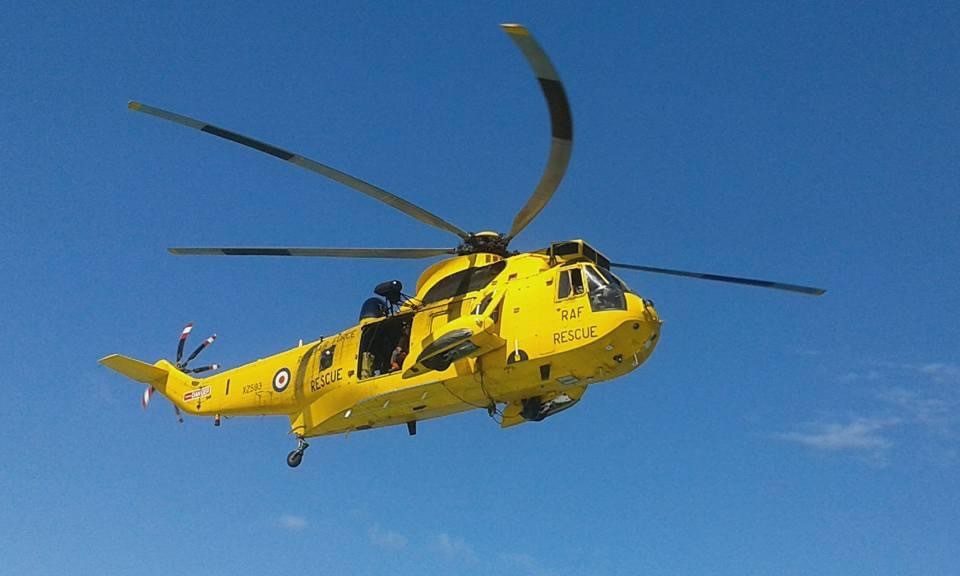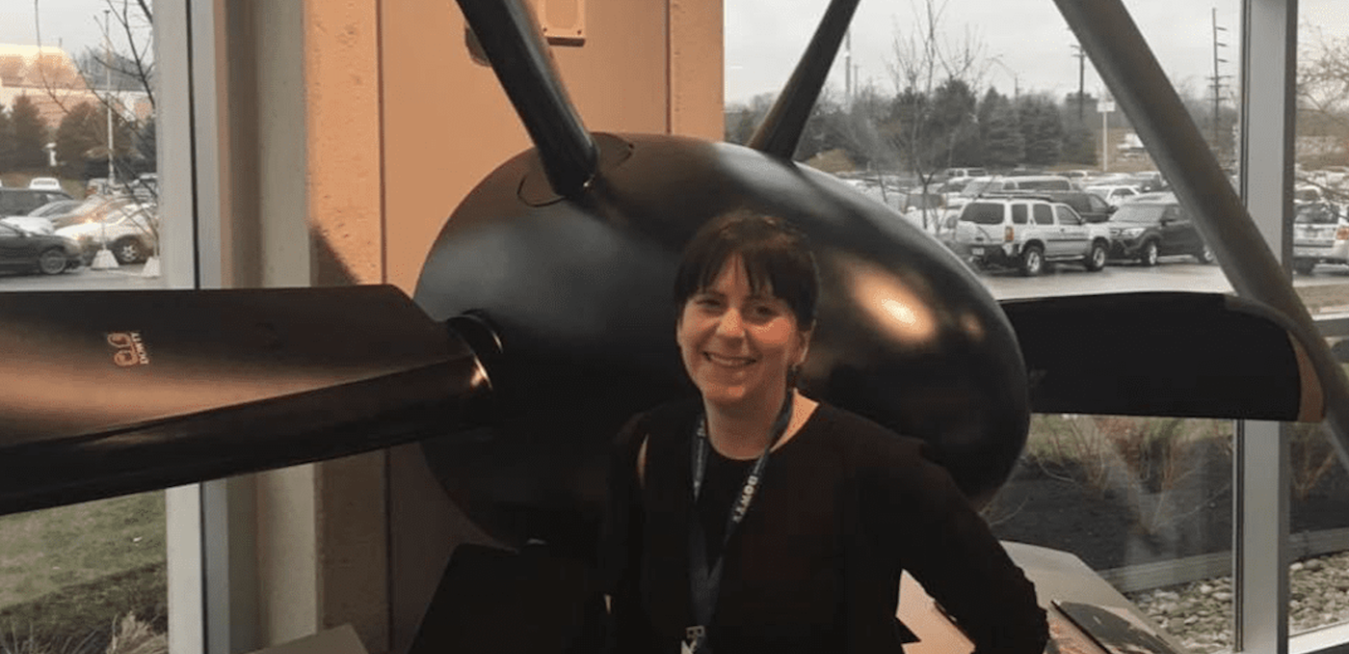The GE Aerospace Blog recently sat down with Hannah Gray, who this year was a finalist in the British Ex-Forces in Business Awards for her work as an advocate for veterans transitioning into commercial careers. She leads GE Aerospace’s Military Officer Leadership Program for the U.K. and is also a regular speaker at Officers Association and Forces Employment Charity employment summits, specifically supporting female veterans and those interested in commercial careers.
Gray was one of the first employees to join GE Aerospace U.K.’s first Military Officer Leadership Program (MOLP). She now leads the program for the U.K. and has successfully hired, coached, and mentored three follow-on MOLP cohorts through to exciting careers within programs, sales, engineering, and supply chain across GE Aerospace and Dowty.
Since joining GE Aerospace, Hannah has also advanced her own commercial career, taking on leadership positions at Dowty and most recently as business operations leader for CFM56 for Europe, Africa, and METCIS [Middle East, Turkey, Commonwealth of Independent States]. Before coming to GE Aerospace, Hannah spent 10 years in the Royal Air Force (RAF) as an engineering officer, with a final posting as chief engineer to the Search and Rescue Force.
Please tell us about the British Ex-Forces in Business Awards. How did it feel to be nominated and find out you were a finalist?
The Ex-Forces in Business Awards is the world’s largest celebration of ex-military in second careers — recognizing the value veterans add to businesses as well as the employers that support the transition of servicemen and -women.
Servicemen and -women spend years adapting to roles and gaining valuable skills. They develop qualities that are hugely adaptable to commercial environments and in demand in the business world, but communicating the transferability of those skills to employers can be challenging. Increasing the visibility of role models — military veterans who have carved out successful second careers — is crucial not only to empowering and inspiring current and future service leavers, but to educating employers on the value of supporting the transition of servicemen and -women. The Ex-Forces in Business Awards is the flagship platform globally for providing that visibility by celebrating the achievements of veterans in the wider workforce and promoting the strong synergies between military values and business excellence. The awards highlight the military-gained skills and qualities that have helped enable their business achievements and recognize the organizations that have supported them.
I was extremely surprised and somewhat shocked to get the email telling me I had been shortlisted, as I didn’t even realize I had been nominated. As the work I do supporting the MOLP and the wider veteran community is entirely voluntary, it was lovely to feel that this is seen and appreciated by the MOLP community and also by the wider GE community. I think we have been incredibly lucky to attract such great talent into GE through the MOLP, so I see the nomination as not only about what I do but also about how GE provides opportunities for veterans to excel and make waves in their second careers.

What motivated you to get involved with the Officers Association and Forces Employment Charity?
The Officers Association and Forces Employment Charity exists to help veterans find employment and to support individuals from the armed forces, as well as their families and dependents. It’s a great platform for me to talk through my own experiences of leaving the military and to provide a helping hand to those coming behind, as well as to highlight the benefits of GE Aerospace’s Military Officer Leadership Program, without which I wouldn’t be where I am today.
MOLP U.K. is currently on its fourth cohort since it launched in 2016, so I’m keen to raise awareness of the program amongst the U.K. military community — it really does provide a fantastic springboard for those leaving the military. Outside of MOLP, which targets ex-officers, GE also has lots of opportunities for veterans from all ranks, branches, and trades.
Why did you choose to apply for MOLP at GE Aerospace?
There are few civilian-equivalent qualifications for the qualifications gained in the military, so it’s important to find an opportunity that allows you to explore your strengths and weaknesses and gain the right experience to help you find the next step in your career.
MOLP allows you to try multiple rotations within the business to find what you’re passionate about — and the results may surprise you. Given my background, it made sense for my first rotation to be in engineering, but by the end I’d developed a real passion for Commercial.
I would have been hard-pressed to find a commercial role in another business due to my lack of experience, but MOLP helped me find my niche. That, in my eyes, is the benefit of the program. You also get fantastic coaching and training opportunities, executive mentorship, and a host of stretch experiences along the way, which allows you to compete for senior-level roles as you exit the program.
What led you to transition from the RAF to the commercial world? Any advice for other military officers looking to transition?
In all honesty, I wasn’t looking to leave the RAF. But a chief technician colleague of mine left the RAF to join GE, and I watched him thrive there.
I’d also just become chief engineer for Search and Rescue Force, which was a fantastic role with a broad portfolio of responsibilities, but it was a role that was coming to an end due to the retirement of the Sea King [search-and-rescue helicopter] and the disbandment of Search and Rescue. I had achieved everything I wanted in the RAF, and after serving in a role with such responsibility at a relatively young age, it led me to think ‘What next?’ I was ready for a new challenge.
For those who are looking to transition, I would say do your research on the opportunities available to you and don’t settle. It would have been easier for me to move into a civilian engineering role, but I wouldn’t have the career satisfaction I do now. Give yourself time to find out what you enjoy.

What’s a key thing you’ve learned during your time at GE Aerospace?
I’ve been at GE Aerospace for seven years now, but over the past two years, during COVID, industrial action, and contracting two major deals, my emotional intelligence has been stretched in ways it’s never been stretched before.
I’ve learned a lot about myself as a leader. And it brought me closer to the team — we had to support and lean on each other in ways we never had previously.
The same goes for our customers. Yet again it comes back to shared experiences — we’ve all experienced hardships over the past few years, which have required us to lean in and change the way we work, for the better.
Tell us more about your role, accomplishments so far, and what motivates you?
I’ve been lucky enough to secure a new role within GE Aerospace’s CFM56 Business Operations Team. Three months into the role, I’ve still got a huge amount to learn and a great opportunity to continue my growth as a commercial leader. My role is responsible for regional product strategy and profitability. What that means in practice is representing the product line, working hand in glove with the sales team to make sure we develop solutions which both meet our customers’ needs and win at the right work for our business. The market dynamics for CFM56 are very different from my previous portfolio, with many more MRO [maintenance, repair, and overhaul] partners and competitors, so I’m learning new commercial strategies and ways of working. That’s the benefit of working at GE Aerospace: There are always new opportunities, so you never stop learning.
Whatever the job title, the customer has always been at the heart of what I do. I count myself lucky that I can relate to the customers, because I’ve been in their shoes — in a hangar without spares, on the receiving end of an urgent technical instruction, needing AOG [aircraft on the ground] assistance.
I’m motivated by building strong relationships. If I hadn’t been close with the ex-colleague who inspired me to join GE, he may not have helped me with the interview process, and ultimately, I wouldn’t have had the opportunities I’ve had through GE Aerospace and through Dowty. Relationship building is critical to any business. Developing relationships across functions and building a complete business view helps you to understand what people contribute and, more importantly, how we work our individual elements for the good of the customer and to help each other succeed.
You could almost say my military and civilian experiences have been complementary. Underpinning each is a focus on how a team works together and how all elements of the business come together for commercial or operational success. That’s why, for me, people will always be front and center in my work.
As I look back on what I’ve achieved to date, it may come as no surprise that I can’t extol the virtues of GE Aerospace and Dowty enough. It’s a very enabling company — you can see it through the multiple opportunities I’ve been offered during my time here — and I would encourage anyone in the U.K. military community looking to make a change to consider MOLP.





